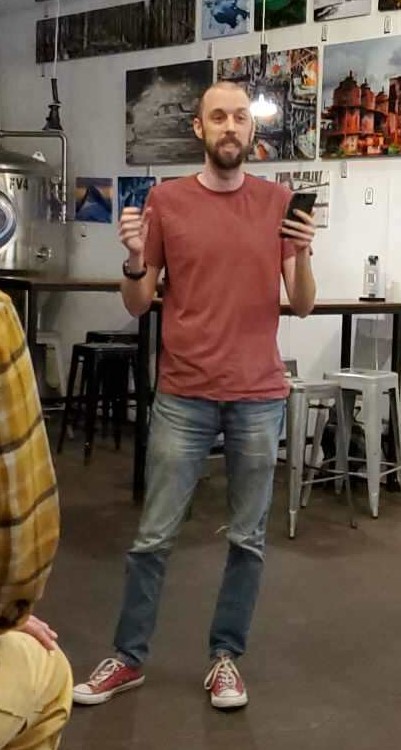After The Planets by Matthew Moniz
with thanks to Gustav Holst
Mars
Far after all the planets have expired,
we’ll look upon our headstone rocks adrift
and back at errant dreams which they inspired—
to give ourselves a universal gift.
That’s if we leave—our ochre neighbor stains
imaginations marching toward those times
of triumph and prestige as our cremains
repeat our fertile hopes for barren climes:
A second habitat, another chance—
we’ll do it over better than before.
Till crashing end, we soar and trod and dance
like airless heirs won’t watch. As lithovore,
we’ll surely do as rovers do and roam—
we’ll scratch for inchy dirt. We’ll claim a home.
The Bringer of War
We’ll scratch for inchy dirt. We’ll claim a home
for empires preaching industry and pride.
Where swords and drills plant flags, plants flag—our loam
lies sketched for lords. Our petty knives provide
sharp borders, satellite precise. The weak
get burgled—force steers course—and wealths accrue
as we ignore the igneous critique
and trawl the depths till ragged cores leak through
and human heartbeats pump percussion’s sound,
mellifluously bellicose. Such grace
indwells our blood. Our blood rests on the ground
and in it, iron red. As is our place
we’ll scurry, stab, dig, dig, and fume, perspired
beneath a clouded atmosphere we sired.
Venus
Beneath a clouded atmosphere we sired
from CO2 when we’ve exhaled or kissed,
our days come summed with some we have desired.
We circle-saunter through this heavy mist
alike our sister-twin, bright star whose light
reveals refractive acid, dense and bronze
and swirled in union’s chemistry, clear sprite
which guides through quiet evenings, placid dawns.
Our haze of happy spirit-breath displays
split embryo’s symphonic sonic bonds
and congregates on clammy clamshell’s dais
as we, too, gather – each of us absconds
performing deep veneers of solshined chrome
from each celestial cell’s each chromosome.
The Bringer of Peace
From each celestial cell’s each chromosome
we multiply to reinforce the choir,
glissando as the eons’ metronome
tocks clean across the panoply of fire
in undiluted nighttime skies. We turn,
mitotic mites—once rent—reunified.
We are this twinkling dust, this shine, this churn
aligned by strings’ accordant chords applied
in logarithmic harmony anew,
not zero-sum destruction, sometimes cowed
into the solipsistic brigands who
co-opt cooperation from the crowd.
We burn to warm, but solo action chars
the bred, the dead, the quick, the us, our scars.
Mercury
The bred, the dead, the quick, the us—our scars
come carved in moment years. Vast assets flash—
we scramble, cash awash, to snatch what’s ours.
Mercurial, the temperature’s panache,
in liquid silver, solid gold, strikes back—
celerity in zephyrous shrift streams free.
Green houses, casting tepid stones, attack
our pale grey drowned in light at apogee
whose avaricious shimmer almost culls
the temperate luck of thieves and twisted snakes
as quarterly we profit, oracles
till, coins on eyes, our rivers stick. Mistakes
compound, and, consequently, we remain
six fleet feet under prodigal terrain.
The Winged Messenger
Six fleet feet under prodigal terrain,
sleek nymphs prepared for flight. And in their nests,
striped honeys huddled, buzzing a refrain
of nectar maps. But we scrawl palimpsests
of mass extinction, climate’s climbing stakes—
these silhouetted harbingers prove probe
and herald further absence. Stout firebreaks,
coal-lunged canaries of our surface globe,
the bees are disappearing. With delays,
scant leptolepidopterists devise
interrogations through our transit days
while bug-eyed suitmen empty from our skies
the ecosystem’s stabilizing spars
to imitate the cold between the stars.
Jupiter
To imitate the cold between the stars
and gather heat and light, we prance to woo—
with stately swagger—autoabattoirs,
gas-powered giants powering us too.
Bright bulbs erupt ablaze, amaze, and make
us feel a god, a king, a king of gods
who disregards the eyefeast bellyache,
our jolly jowls adrool at even odds
we’ll end before the end. We bloat inside
with fleshy sparks conducting conduct’s volts
through wirefed hierarchies. Our lives elide
a surface striated with thunderbolts,
engorged alike the sweet endorphined brain
we all do all we can to just maintain.
The Bringer of Jollity
We all do all we can to just maintain
the mask of justice, plastic parody
of parity. Its polyurethane
grants thanes performed deniability
with grincurved teeth beneath the forward eyes
of predators. We all must smile when faced
with this arrangement. Frolic’s follies rise
and curtsy curtly—spacewalk foleys taste
consumption’s fullness. Gestures wax enlarged
since going through these motions won’t ablate
each static visage, positively charged.
To blend in, grow, create, and procreate
seems just enough excuse, so we endow
our ways of living ringed with excess now.
Saturn
Our ways of living ringed with excess. Now
we live the same—our bifurcating sphere,
alike our forebears’ effervescent scow,
steers absent foresight. Ever inaustere,
our disparate descants, straining steps shed dust—
glassed sands compact and smooth but won’t recant
long clocked-out clangs they bury, hide, encrust.
Inchoate, we’ll continue till we can’t.
Each tree’s own inner orbits replicate
concentric pitter-patter patterns’ frieze—
we do, descendants too, until the date
our pregnant stomachs’ landfill legacies
divide us from Cassandras who observed
we privilege present, plan for pasts preserved.
The Bringer of Old Age
We privilege present, plan for pasts preserved,
conveniently museumed, ambered, stilled
in echoing halls of memory, conserved
for no one but the boisterous dead. We gild
our past as autumn’s awning crumbles. Schemed
self-loving cryochronicles these times
to freeze existence as we claim it seemed
when we were young, our panting pantomimes
consuming children, never overthrown.
Consumed, our own banallest annals say
we once were of a future, hoped and known,
nunc dominorum sine nomine.
By vague command, we stunt each springing bough
by efforts we ourselves will disavow.
Uranus
By efforts we ourselves will disavow,
accumulated droplets form a wake,
each minor act congealing to allow
one gestalt hurricane to overtake,
through tilted spin, our sky wiped clear, domain
of icewinds featureless in firmament,
no trace, beyond the rains, of ruined reign—
with fathers’ fathers oft forgotten, pent
at telescopic distance, as the faux
dark ceilings of our sheltered dugout caves
push farther, inconspicuous below
our welkin whelm, as gazes slight our graves
and destinies arrive first-come-first-served,
we skyward-eyed deny what stones we curved.
The Magician
We skyward-eyed deny what stones we curved
and which we left unturned and glance askance
as information slaughterhouses swerve
to swift manipulate attention’s trance.
To get their cattle chattel chatting, brands
sear dangling milky dreamclouds, bounteous schmalz,
as greenwashed product rinses clean red hands,
as piebald pipers shift blue cups and balls,
enthralling shell game. We applaud, surprised
by old realities of sunken wharves,
of prestidigitation digitized,
of disappearing flowers, endless scarves.
We won’t crack content’s code, afraid to flee
what undiscovered underworlds we’d see.
Neptune
What undiscovered underworlds we’d see
if we enhanced our hindsight’s field of view—
the tide comes in, obliged to gravity.
The tide goes out—with blissful ballyhoo,
its course predicted mathematically,
its azure stature, oceanic hue,
primordial cordial foaming filigree,
the tide comes in, sustains our retinue.
The tide goes out, unwavering, carefree—
past handmade islands’ undercurrents, through
our depths with nets and spears, diverse debris
finds long-term second homes, dull deja vu,
and settles in dark bottoms of the sea
in earthy Earth’s memetic memory.
The Mystic
In earthy Earth’s memetic memory,
what augurs ought to augment, but we spurn
eidetic edifices’ stonefaced plea:
days happen on their own. But as we turn,
wolves bluntly cry of crying wolf, dodge rents,
and holster music chiming from the spheres
to shut the doors on choruses’ laments,
repeated admonitions, and arrears.
We can’t pretend we’ll get more than this slow
old disregarded globe, which we foresee
with no more weeping worlds to conquer, no
more stars to run to, no one else to be,
no admiration left to be acquired
far after all the planets have expired.
After the Planets
Far after all the planets have expired
we’ll scratch for inchy dirt. We’ll claim a home
beneath a clouded atmosphere we sired
from each celestial cell’s each chromosome.
The bred, the dead, the quick, the us—our scars
six fleet feet under prodigal terrain
to imitate the cold between the stars—
we all do all we can to just maintain
our ways of living ringed with excess. Now
we privilege present, plan for pasts preserved
by efforts we ourselves will disavow.
We skyward-eyed deny what stones we curved,
what undiscovered underworlds we’d see
in earthy Earth’s memetic memory.

Matthew Moniz recently received his PhD in poetry at the University of Southern Mississippi. Originally from the DC area, he holds an MFA and MA from McNeese State University and a BA from Notre Dame. Matt’s work has appeared in or is forthcoming from Crab Orchard Review, Meridian, Tupelo Quarterly, Fourteen Hills, and minnesota review. He has been awarded the SCMLA Poetry Prize and grown in workshops with Tin House and the Community of Writers.
Praise for the winning sonnet crown:
“after The Planets” is dazzling, a planetary firework display. The skill on show is extraordinary: the internal echoes and wordplay (“each celestial cell’s each chromosome”—rhyming with “chrome”); the combining of the legendary qualities of the Classical gods after which they’re named with the physical properties of the planets themselves; the variety of form within extremely strict rules—this is virtuosity of the highest level. The surface is so bright that the sequence needs re-reading for its seriousness to come through—but that brightness is its glory, and why I could not resist it.
~ Julia Griffin, Judge
